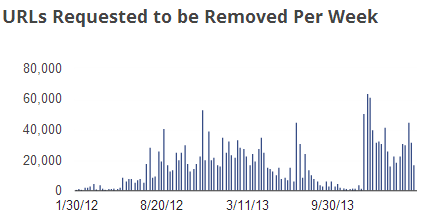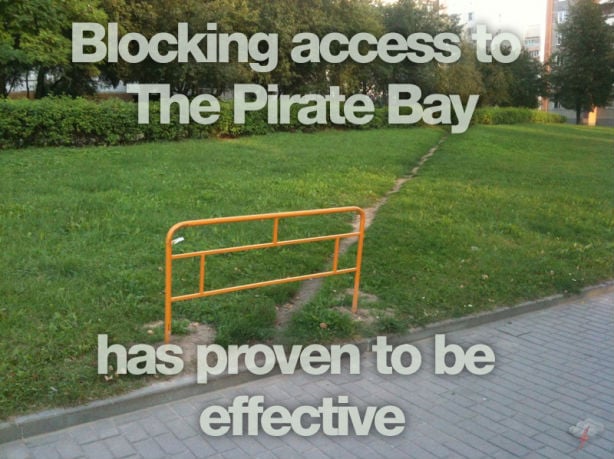TorrentFreak Email Update |
- UK Police Force Shutdown of Sports Torrent Network
- Top 10 Most Pirated Movies of The Week – 04/21/14
- The Copyright Monopoly’s Fundamental Problem Remains The Same…
- Google Asked to Censor Two Million Pirate Bay URLs
| UK Police Force Shutdown of Sports Torrent Network Posted: 21 Apr 2014 02:00 AM PDT
Many sites subsequently reported receiving letters from PIPCU, the Police Intellectual Property Crime Unit, warning that their operations had been scouted and deemed to be infringing. While most site ignored the warnings, some inevitably felt the pressure and decided to quit while they were ahead. In the months that followed direct pressure on sites reduced when police began to concentrate on indirect measures, such as pressuring registrars to retract domains and advertisers to stop supporting sharing sites. However, earlier this month police restarted their direct approach, sending threat letters out to the operators of torrent sites in an attempt to close them down directly. In at least one case the police have been successful. Due to its coverage of sports including the NHL, NBA, soccer and Formula 1, The Sports Torrent Network (TSTN) was a site popular with fans on both sides of the Atlantic. With an estimated 20,000 userbase and its own ‘capping’ team, the site was certainly a fan favorite and possibly the largest site of its type. But now, after an unwelcome warning, the party is over.  Along with other sites, a little under two weeks ago TSTN received communications from the police which stated that the site’s operators could be committing crimes with serious penalties attached. “Such activity is an indictable offense under the Serious Crime Act 2007 and is punishable by up to ten years' imprisonment (two years for encouraging/assisting communication to the public; and ten years for encouraging/assisting distribution to the public),” the police explained. “PIPCU has the lawful right to pursue action against you and against the thesportstorrentnetwork.co.uk website in order to prevent, detect and disrupt criminal activity.” While the threats looked official enough, a more detailed examination of the correspondence sent to TSTN raised questions over its authenticity. As can be seen from the screenshot below, a clear spelling error was present in the title of the mail, which lead to concerns this may have been some kind of fake.  However, an additional error later in the email suggested that it was probably genuine. As can be seen under the highlight, it appears that police neglected to fill in a precise date instead of the placeholder text.  But errors aside, the TSTN decided that while it had been a good run, now was the time to thrown in the towel. The site is now permanently closed. “We are sad the site had to go but feel it was the only option,” a staff member told TF. As is often the case with premature site closures, TSTN’s members have nowhere to call home. It’s often overlooked that torrent sites double up as community sites so the loss of content is often secondary to losing contact with friends. With that in mind two locations have been set up for former TSTN members to stay in touch – over at Reddit and a dedicated discussion forum. With calls from the UK Prime Minister’s IP advisor to permanently fund the Intellectual Property Crime Unit, the shutdown of TSTN will certainly not be the last. Source: TorrentFreak, for the latest info on copyright, file-sharing and anonymous VPN services. | ||||||||||||||||||||||||||||||||||||||||||||||||
| Top 10 Most Pirated Movies of The Week – 04/21/14 Posted: 21 Apr 2014 12:18 AM PDT
Son of Batman is the most downloaded movie this week. The data for our weekly download chart is estimated by TorrentFreak, and is for informational and educational reference only. All the movies in the list are BD/DVDrips unless stated otherwise. RSS feed for the weekly movie download chart.
Source: TorrentFreak, for the latest info on copyright, file-sharing and anonymous VPN services. | ||||||||||||||||||||||||||||||||||||||||||||||||
| The Copyright Monopoly’s Fundamental Problem Remains The Same… Posted: 20 Apr 2014 02:00 PM PDT
However, some part of these transmissions may be in violation of the copyright monopoly. The only way to find if any are is to listen to them and break the postal secret; to open all the digital letters and violate the privacy of correspondence. There is no way to enforce the copyright monopoly without reading all the private communications in transit – mass eavesdropping and mass surveillance. There is no magic way to just wiretap the violations and ignore the rest; the act of finding which communications may violate the copyright monopoly requires that you sort all correspondence into legal and illegal. The act of sorting requires observation; you cannot determine if something is legal or illegal without looking at it. At that point, the postal secret and the privacy of correspondence have been broken. (Some proponents of the copyright monopoly would argue that the act of sharing knowledge and culture wouldn’t classify as private correspondence. This is irrelevant, as in any case, it is intermixed with private correspondence that must still be unpacked and looked at in the sorting process.) So we’re at a crossroads where we as a society must determine which is more important – the right to communicate in private at all, or the obsolete distribution and manufacturing monopoly of an entertainment industry. These two are completely mutually exclusive and cannot coexist. This is, and has been, the problem since the cassette tape. The copyright industry understands this perfectly, which is why they have been working hard, long, and tenaciously to eliminate the concept of private correspondence online and introduce ubiquitous mass surveillance. A few examples: In Ireland, the copyright industry (in the shape of the big four record labels) sued the country’s largest ISP, Eircom, for the right to install wiretapping and censorship equipment in the deepest of their core Internet switches: they demanded the ability to detect and prevent communications they didn’t like. Yes, you read that right: a private industry full-out demanded the right to examine all (and prevent any) private correspondence in the entire country. In Sweden, the copyright industry did a two-pronged approach to get their own access to ISP access logs through a ridiculous over-implementation of the IPRED directive, along with working feverently to get mandatory ISP logging in the shape of Data Retention passed (the mass surveillance mechanism that was just now declared in violation of basic human rights by the highest EU court). The copyright industry (in the shape of IFPI) even demanded independent, extrajudicial access to the mass surveillance data from the Data Retention mechanisms. Yes, you read that right: a private industry demanded independent and unfiltered access to surveillance records of practically every footstep and every correspondence you make in your everyday life. The copyright industry is very much a part of the mass surveillance industry. Mass surveillance is the only way they can maintain their crumbling monopoly on manufacturing copies. At the end of the day, these two mechanisms must be weighed against one another: do we prefer the ability to communicate in private at all, or do we prefer the distribution and manufacturing monopoly of an entertainment industry? As is today, they can’t coexist, and this has always been and still remains the key point of contention. One of the reasons that we’ve gotten to this point is that these two mechanisms are usually handled by different departments. The copyright monopoly tends to be under the Department of Commerce, whereas the fundamental rights such as freedom of speech and privacy of correspondence falls under the Department of Justice in most countries. This means that there has never been anybody with the responsibility of weighing them against each other, and coming to the obvious conclusion that the right to private correspondence far outweighs the distribution and manufacturing monopoly of an entertainment industry. We need to keep kicking politicians out of office until they realize this enormous blind spot of theirs.  About The Author Rick Falkvinge is a regular columnist on TorrentFreak, sharing his thoughts every other week. He is the founder of the Swedish and first Pirate Party, a whisky aficionado, and a low-altitude motorcycle pilot. His blog at falkvinge.net focuses on information policy. Book Falkvinge as speaker? Source: TorrentFreak, for the latest info on copyright, file-sharing and anonymous VPN services. | ||||||||||||||||||||||||||||||||||||||||||||||||
| Google Asked to Censor Two Million Pirate Bay URLs Posted: 20 Apr 2014 10:40 AM PDT
One of the top domains listed in these notices is thepiratebay.se. Since the notorious torrent site doesn’t accept takedown requests itself, copyright holders have to turn to Google to do something about the appearance of their work on the infamous torrent site. This week the number of thepiratebay.se URLs submitted to Google reached the two million mark. Nearly all of these links have been removed and can no longer be accessed through search results. The chart below shows the number of links that have been submitted per week. There is a sharp decline towards the end of 2013 when The Pirate Bay used another domain name. The requests increased again in December when the torrent site switched back.  In total, the two million URLs were submitted in 93,070 separate takedown notices, averaging more than 20 links per takedown request. A staggering number, but one that pales in comparison to other sites. Looking at the list of domains that received the most URLs removal requests, The Pirate Bay ends up in 29th place. The top spot goes to filestube.com with more than 11 million URLs, followed by dilandau.eu, rapidgator.net, zippyshare.com and 4shared.com.Torrentz.eu, the first torrent site in the list, comes in 8th with 4.4 million URLs. The million dollar question is of course whether all these takedown requests have had a significant impact on the availability of pirated content. According to Google, the two million URLs represent between one and five percent of all links that are indexed, so it’s safe to say that there’s still plenty of Pirate Bay content available via Google. Similarly, removing the search results doesn’t hinder people from going to the notorious torrent site directly. The Pirate Bay itself isn’t particularly concerned about this development. The site’s traffic has increased steadily over the past few years, and so has the number of files being uploaded to the site. In common with the many ISP blockades of The Pirate Bay, it’s safe to conclude that people can find plenty of alternative routes to end up where they want to be…  Source: TorrentFreak, for the latest info on copyright, file-sharing and anonymous VPN services. | ||||||||||||||||||||||||||||||||||||||||||||||||
| You are subscribed to email updates from TorrentFreak To stop receiving these emails, you may unsubscribe now. | Email delivery powered by Google |
| Google Inc., 20 West Kinzie, Chicago IL USA 60610 | |


 When we share knowledge and culture in order to manufacture our own copies of it, this happens in private communications – it happens as part of the ones and zeroes that arrive at and are transmitted from our computers.
When we share knowledge and culture in order to manufacture our own copies of it, this happens in private communications – it happens as part of the ones and zeroes that arrive at and are transmitted from our computers. 